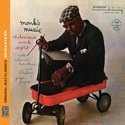
Thelonious Monk Septet
Monk’s Music
Riverside
When I go, I want them to play this opening cut at my funeral. Maybe not this one exact version of “Abide With Me,” but a sax and trumpet adds an element of cool to any sort of church music at a memorial service. But beyond the odd and unexpected opening on this Riverside re-issue remaster, the sound here falls squarely into the late ’50s jazz groove. Thelonious Monk was 40 when this appeared, and the consensus regarded him (and I’m stealing this from the excellent liner notes) as “too far-out for public consumption.” So why was this album a hit? Perhaps the public became more educated and accepting of the broken rhythms of high concept jazz, perhaps Monk had calmed down to more commercial standards, and probably a little of both.
There were six original tracks on the vinyl, and the CD makes room for three more items. “Well, You Needn’t” has passages that are familiar to modern ears but still pulls us into a “What was he thinking?” attitude. Monk’s piano stays in the background while Gigi Gryce heads off into the clouds on alto sax. I’m not always able to keep up with where he’s headed on the solos but when the band is all playing at once, there’s more coherence, and I dare say (and it’s a double-dog-dare) that there are echoes of trite dance hall music in this cut. I’m sure they are used ironically. What else would Monk and crew do?
A slower, mournful sax from John Coltrane slows down “Ruby, My Dear.” This is the Mad Men audio backdrop, echoing endlessly through the Vegas clubs and late night cabarets that my parents might have frequented, if they didn’t have stable jobs and a house in the suburbs. “Off Minor (Take 5)” relies on a tighter brass line that spurts out shiny little blasts at the end of every four or five bars. Amplify it, and it’s the foundation of ’60s soul music; tone it down and it becomes a piquant chaser that marks your progress through the mid-century Broadway stage. There’s a second version of this in the bonus section, although I’m not sharp enough to tell them apart.
“Epistrophy” dates back to the ’40s, so by this recording Monk had time to hone it. Odd chords bounce off the piano, and again, it’s the trumpet (Ray Copeland) and not the piano that holds your attention. A piano riff starts the action rolling, but then fades back, even though it’s subtly suggesting new paths to the rest of the band who gladly follow along.
The last official track, “Crepuscule with Nellie (Take 6),” also reappears in the bonus material. Slow and meandering, it’s the dreamiest track filled with introspection, dissonances relieved by short sweet chord progressions, and a swish of the brush on cymbals. Here, Monk’s piano is no more intrusive than on other cuts, but stand proud as the brass and drums tire and feel in need of a nap. We can close the record with the final bonus track, “Blues for Tomorrow.” Monk’s not on this, and the music is much more traditional with a brash boogie-woogie and occasional taps on wood suggesting a woodpecker attacking the side of the piano. Written by Mr. Gryce, perhaps it was recorded when Mr. Monk stepped out to take a phone call. This is jazz filled with an antique old-school modernism from the days when houses and gas stations took on weird angles and the world was a magical place, transformation was in the air, and no one wanted to look like or sound like anything that had come before. While this disc is retro to our ears, it was space age before we launched our first rocket.
Concord Music Group: http://www.concordmusicgroup.com












